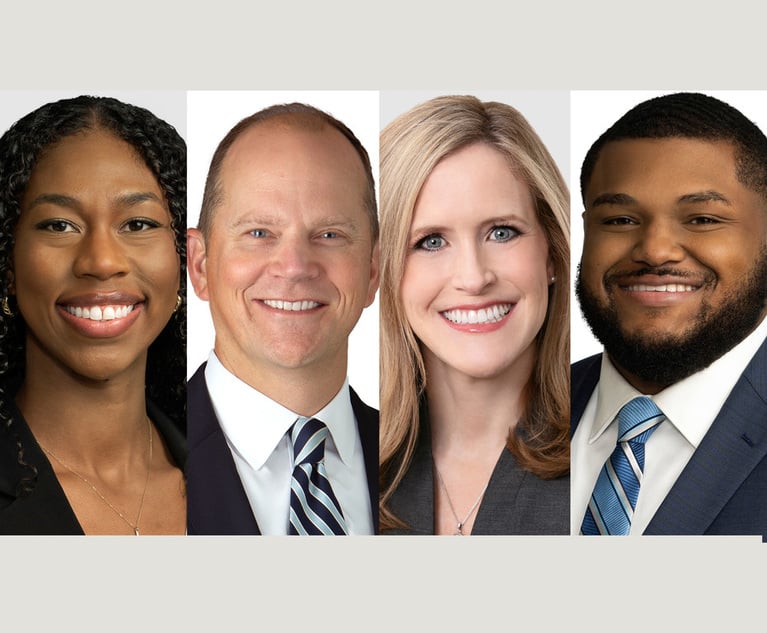 Barry M. Klayman, left, and Mark E. Felger, right. Courtesy photos
Barry M. Klayman, left, and Mark E. Felger, right. Courtesy photos Equity May Allow a Pro Rata Recovery in a Derivative Action
The Delaware Court of Chancery has broad discretion to tailor a remedy to suit a particular situation. The recovery in a derivative action generally goes to the corporation, but that rule is not absolute.
July 06, 2022 at 12:05 PM
6 minute read
The Delaware Court of Chancery has broad discretion to tailor a remedy to suit a particular situation. The recovery in a derivative action generally goes to the corporation, but that rule is not absolute. Treatises and commentators have recognized that courts will grant pro rata recoveries where the equities demand it. In Goldstein v. Denner, C.A. No. 2020-1061-JTL, 2022 WL 1797224 (Del. Ch. June 2, 2022), Vice Chancellor J. Travis Laster discussed the circumstances under which the court might allow a pro rata recovery in the context of a derivative action. Goldstein dealt with a motion to dismiss insider trading claims. The lawsuit alleged a breach of fiduciary duty against officers and directors of Bioverativ, Inc., and investment fund Sarissa Capital Management and its affiliates in connection with the sale of Bioverativ to Sanofi S.A. Alex Denner, one of the directors of Bioverativ and a person in control of Sarissa, was accused of seeking to delay public knowledge of Sanofi's interest in Bioverativ while Sarissa secretly purchased shares of Bioverativ in such a manner as to avoid triggering disclosure requirements. The purchases and subsequent sales resulted in almost $50 million in profits to Denner. Laster had previously denied motions to dismiss claims that the members of the Bioverativ board and three of the company's officers had breached their fiduciary duties during the sale process. See Goldstein v. Denner, 2022 WL 1671006 (Del. Ch. May 26, 2022). He had reserved decision on the insider trading and aiding and abetting allegations against Denner and Sarissa. They argued that the plaintiff had failed to state a reasonably conceivable claim that Denner had breached his duty of loyalty by causing Sarissa to purchase shares of Bioverativ after he learned material, nonpublic information about Sanofi's interest in acquiring the company. They also argued that the plaintiff lost standing to pursue the insider trading claims when the transaction closed. The plaintiff explained that he was not pursuing the insider trading claims as derivative claims, but rather as a means of challenging the sale transaction. The defendants said that if that were the case, then the insider trading claims duplicated the sales process claims and should be dismissed on that basis. It is the vice chancellor's treatment of that argument that is of special interest.
Laster concluded that it was highly unlikely that the insider trading claims would be duplicative of the sale process claims. The principal question raised by the sales process claims was whether the sale process was outside the range of reasonableness due to a nonexculpated breach of fiduciary duty by Denner. The likely remedy would be an award of classwide damages based on the value that the stockholders would have received if the defendants had followed a reasonable process and obtained the best price reasonably available, either by closing the sale at a higher price or by causing Bioverativ to remain a stand-alone entity and capitalize on the company's business plan.
This content has been archived. It is available through our partners, LexisNexis® and Bloomberg Law.
To view this content, please continue to their sites.
Not a Lexis Subscriber?
Subscribe Now
Not a Bloomberg Law Subscriber?
Subscribe Now
NOT FOR REPRINT
© 2025 ALM Global, LLC, All Rights Reserved. Request academic re-use from www.copyright.com. All other uses, submit a request to [email protected]. For more information visit Asset & Logo Licensing.
You Might Like
View All

The Importance of Contractual Language in Analyzing Post-Closing Earnout Disputes
6 minute read
Delaware Supreme Court Upholds Court of Chancery’s Refusal to Blue Pencil an Unreasonable Covenant Not to Compete
4 minute readLaw Firms Mentioned
Trending Stories
- 1We the People?
- 2New York-Based Skadden Team Joins White & Case Group in Mexico City for Citigroup Demerger
- 3No Two Wildfires Alike: Lawyers Take Different Legal Strategies in California
- 4Poop-Themed Dog Toy OK as Parody, but Still Tarnished Jack Daniel’s Brand, Court Says
- 5Meet the New President of NY's Association of Trial Court Jurists
Who Got The Work
J. Brugh Lower of Gibbons has entered an appearance for industrial equipment supplier Devco Corporation in a pending trademark infringement lawsuit. The suit, accusing the defendant of selling knock-off Graco products, was filed Dec. 18 in New Jersey District Court by Rivkin Radler on behalf of Graco Inc. and Graco Minnesota. The case, assigned to U.S. District Judge Zahid N. Quraishi, is 3:24-cv-11294, Graco Inc. et al v. Devco Corporation.
Who Got The Work
Rebecca Maller-Stein and Kent A. Yalowitz of Arnold & Porter Kaye Scholer have entered their appearances for Hanaco Venture Capital and its executives, Lior Prosor and David Frankel, in a pending securities lawsuit. The action, filed on Dec. 24 in New York Southern District Court by Zell, Aron & Co. on behalf of Goldeneye Advisors, accuses the defendants of negligently and fraudulently managing the plaintiff's $1 million investment. The case, assigned to U.S. District Judge Vernon S. Broderick, is 1:24-cv-09918, Goldeneye Advisors, LLC v. Hanaco Venture Capital, Ltd. et al.
Who Got The Work
Attorneys from A&O Shearman has stepped in as defense counsel for Toronto-Dominion Bank and other defendants in a pending securities class action. The suit, filed Dec. 11 in New York Southern District Court by Bleichmar Fonti & Auld, accuses the defendants of concealing the bank's 'pervasive' deficiencies in regards to its compliance with the Bank Secrecy Act and the quality of its anti-money laundering controls. The case, assigned to U.S. District Judge Arun Subramanian, is 1:24-cv-09445, Gonzalez v. The Toronto-Dominion Bank et al.
Who Got The Work
Crown Castle International, a Pennsylvania company providing shared communications infrastructure, has turned to Luke D. Wolf of Gordon Rees Scully Mansukhani to fend off a pending breach-of-contract lawsuit. The court action, filed Nov. 25 in Michigan Eastern District Court by Hooper Hathaway PC on behalf of The Town Residences LLC, accuses Crown Castle of failing to transfer approximately $30,000 in utility payments from T-Mobile in breach of a roof-top lease and assignment agreement. The case, assigned to U.S. District Judge Susan K. Declercq, is 2:24-cv-13131, The Town Residences LLC v. T-Mobile US, Inc. et al.
Who Got The Work
Wilfred P. Coronato and Daniel M. Schwartz of McCarter & English have stepped in as defense counsel to Electrolux Home Products Inc. in a pending product liability lawsuit. The court action, filed Nov. 26 in New York Eastern District Court by Poulos Lopiccolo PC and Nagel Rice LLP on behalf of David Stern, alleges that the defendant's refrigerators’ drawers and shelving repeatedly break and fall apart within months after purchase. The case, assigned to U.S. District Judge Joan M. Azrack, is 2:24-cv-08204, Stern v. Electrolux Home Products, Inc.
Featured Firms
Law Offices of Gary Martin Hays & Associates, P.C.
(470) 294-1674
Law Offices of Mark E. Salomone
(857) 444-6468
Smith & Hassler
(713) 739-1250







